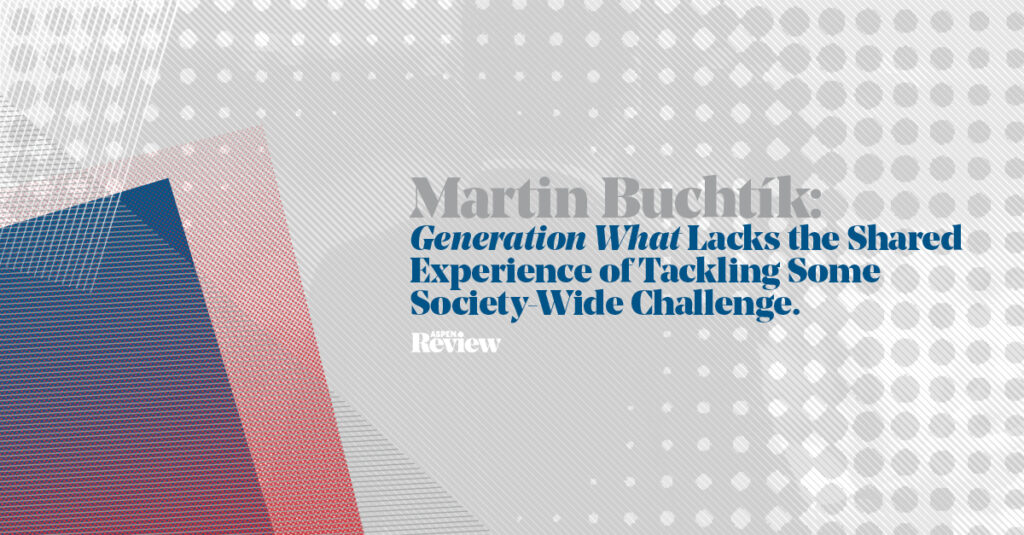Articles
The Rise of Radicalism Among Young People in Slovakia: Causes and Consequences
The results of the 2016 general election delivered quite a shock to Slovakia’s democrats. The most chilling of the many surprises was the fact that a far-right People’s Party—Our Slovakia (ĽSNS) made it into the country’s parliament. A party whose relevance had, until then, been solely regional (its leader is the governor of one of…

Martin Buchtík: Generation What Lacks the Shared Experience of Tackling Some Society-Wide Challenge.
Research on the opinions of young people between the ages of 18 and 34 shows that thanks to modern communications this generation has no problems moving out of the environment into which they were born and have lived in—says Martin Buchtík in an interview with Robert Schuster.
Young Hungarians: A Nascent Political Generation
In the last decade, young people in Hungary have turned away from traditional political parties and, as it seemed for a long time, also from politics itself. However, now they launched their own movement.

Let Us Have Our Dreams
How long can you keep telling people that they should be grateful for open borders, if they do not remember the reality without freedom of movement? The propaganda of success pursued by the pro-Union establishment had something of the subtlety of 20th-century authoritarian regimes.

Don’t Blow Your Nose on the Floor
In The Good Soldier Švejk Jaroslav Hašek mentions a certain Pole who “kept aristocratically aloof, ignored everyone and played with his own hand, blowing his nose on the floor using two fingers, spreading the snot with the butt of his rifle, and then he deftly rubbed the butt against his trousers and from time to…
Youth Forward or Backward?
Dear Readers, Each generation faces their own specific challenges. The youth is usually blamed by elders for all vices in society. My generation viewed with deep suspicion how Communist ideologues formally pushed and praised young generation while cementing a sclerotic system led by gerontocratic politburos. Twenty-eight years after liberation from that ideological yoke, the younger…

Kenneth R. Weinstein: Trump Knows More about Central Europe than He’s Given Credit
An Interview with Kenneth R. Weinstein by Jakub MajmurekCentral European nations should continue their advocacy efforts here in the United States, and work to rebuild some of the ties that have weakened in recent years. President Trump understands the fragile world of Central and Eastern Europe and has greater knowledge of the region than most…
FOREWORD18
It is my pleasure to introduce to you the 2014 spring issue of the Aspen Review that arrives in times of substantial redefinition in transatlantic relations. Recent events at the EU Eastern border forced the Union to better coordinate its external action and strengthen ties with the US. The Crimean crisis also served as a vivid…
FOREWORD
Dear readers, I am happy to present the new issue of our quarterly, commemorating the milestone events that took place in Central and Eastern Europe 25 years ago. The focus is on how the fall of Communism has affected global politics as well as the region’s economies and societies. Transformation in Central Europe will also…
FOREWORD
Dear readers, I hope you had a great summer. The fall of 2013 bears further fruitful Aspen events for us to look forward to together. In June we were pleased to welcome to Prague Jean-Claude Trichet, the former European Central Bank Governor, who took part in a public debate entitled “Euro – the Past and…
FOREWORD
Dear readers, soon we will celebrate the Aspen Institute Prague’s first anniversary. In a less than twelve months, we managed to fulfill all goals set for the first year, including the plan to establish Aspen Prague in the international environment, which makes us particularly happy. In early April, we have organized already a second event…
FOREWORD
Dear readers, You are holding in your hands the latest issue of the quarterly Aspen Review Central Europe, with the main theme concerning the renationalisation of the European Union. The content of the current issue is commented on the following page by its editor, Alek Kaczorowski. Following is a summary of what the past quarter…
FOREWORD
As many of you may have noticed in the media, we launched our activities in Central Europe with the international conference “Crisis as Opportunity: Europe and the United States in a Globalized World” that focused on the most urgent political and economic issues of today. On 19 July 2012 we welcomed Madeleine Albright, one of…
FOREWORD
Dear readers, The content of the new Aspen Review Central Europe embraces the inauspicious situation in Ukraine, and thus engages into the debate on the EU position in the world. We find ourselves at the historical crossroads, where the EU member states are challenged to re-think their relations with neighbors and political involvement in the…
FOREWORD
We decided to dedicate this issue of Aspen Review Central Europe to the erosion of mutual trust and a re-emergence of old stereotypes in current public discourse in Europe. Central European states became members of the European Union more than a decade ago. Because of their negative attitude towards suggested measures to tackle the refugee…
FOREWORD
Dear readers, Since 2008, “crisis” has become a buzzword, while an overarching declinist mood has contaminated public discourse. In his 2012 book The Great Degeneration—How Institutions Decay and Economies Die, British historian Niall Ferguson described the decline of those institutions that constitute Western society: representative democracy, free market economy, rule of law, and civil society.…
FOREWORD
Dear readers, With this editorial I would like to draw your attention to our last annual conference Czech Republic: The Shape We’re In. It was the most important event of the year for the Aspen Institute Prague, which started an ambitious long-term evaluation of the state of the Czech Republic and the region. The underlying…
FOREWORD
Dear readers, We are living in a time when formal education is accessible to more individuals than ever before. It is considered a key to personal and social development, and prosperity. However, education is also facing significant challenges brought by the digital era. Therefore we have decided to devote this Aspen Review issue to the…
